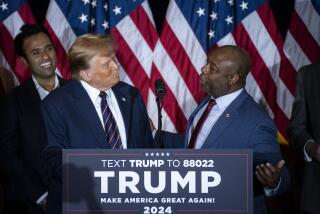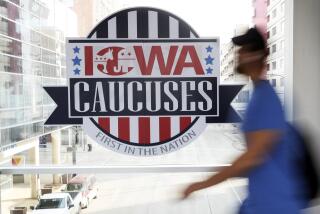POLITICAL BRIEFING
- Share via
FIRST FLUB: Stumping the country to seek support for his Democratic presidential candidacy, Iowa Sen. Tom Harkin has been citing a singular accomplishment: His reelection last November made him the first Democrat reelected to the Senate in the history of Iowa. Or so he believed--and until recently no one disputed him.
But it turns out Harkin was mistaken. A look back at Iowa’s political history shows that another Democrat, Guy Mark Gillette, was elected to the Senate in 1936 to fill out the last two years of an unexpired term, then reelected in 1938.
“I’ll be damned,” Harkin said when he heard the news. An aide explained that most people assumed Gillette had been appointed rather than elected since his first term was for only two years. As for Harkin, who has formally entered the race for the nomination, he will have to settle for claiming to be the first Iowa Democrat reelected to the Senate in more than half a century.
FASHION CRITIC: Former President Richard M. Nixon says he is worried that both President Bush and Vice President Dan Quayle are sending voters the wrong signal by permitting so much focus on their frenetic pursuit of relaxation. Nixon--who rarely ventured outside the White House without a suit--has told associates that he’s concerned voters may conclude the President “is not taking care of business” because he seems to be spending so much time on the golf course and in his powerboat. Some Republican operatives say the frequent photos of Bush relaxing in a polo shirt allow him to project more of a “regular guy” image. But Nixon maintains “the average guy is not on the golf course, the tennis court or a speedboat because he doesn’t have one,” according to one source who has spoken with him recently. With that concern in mind, Nixon has told Quayle directly that he should stop bringing his golf clubs with him as he travels around the world.
QUOTABLE: Arkansas Gov. Bill Clinton’s campaign treasurer, Robert Farmer, was asked at a press conference whether the prospect of two Senate races in 1992 had drained California of money for presidential hopefuls.
“I’m always amazed when I go to California . . .,” Farmer said. “It seems to be a bottomless well. Everyone goes in there and comes out with a lot of money. California is a place I hope to see a lot of.”
TRIMMING THE DEBATE GLUT: The Democratic National Committee hopes to ease the expected pressure on the party’s 1992 presidential candidates to appear at debates all over the country.
In past campaigns, contenders for the presidential nomination often have been whipsawed by local party organizations and special-interest groups, which staged debates mainly to gain publicity and promote their own special concerns. For candidates, who feared that failure to show up would cost them vitally needed support, the debates turned into command performances.
But this year, with the campaign already foreshortened, party leaders are drafting a plan under which the DNC will sponsor a limited number of debates, both on its own and in partnership with other groups. Party officials hope the new procedure not only will make it easier for presidential candidates to turn down other invitations, but also will keep the campaign dialogue focused on the mainstream issues that Democrats believe they need to hammer home to regain the White House.
More to Read
Get the L.A. Times Politics newsletter
Deeply reported insights into legislation, politics and policy from Sacramento, Washington and beyond. In your inbox twice per week.
You may occasionally receive promotional content from the Los Angeles Times.







